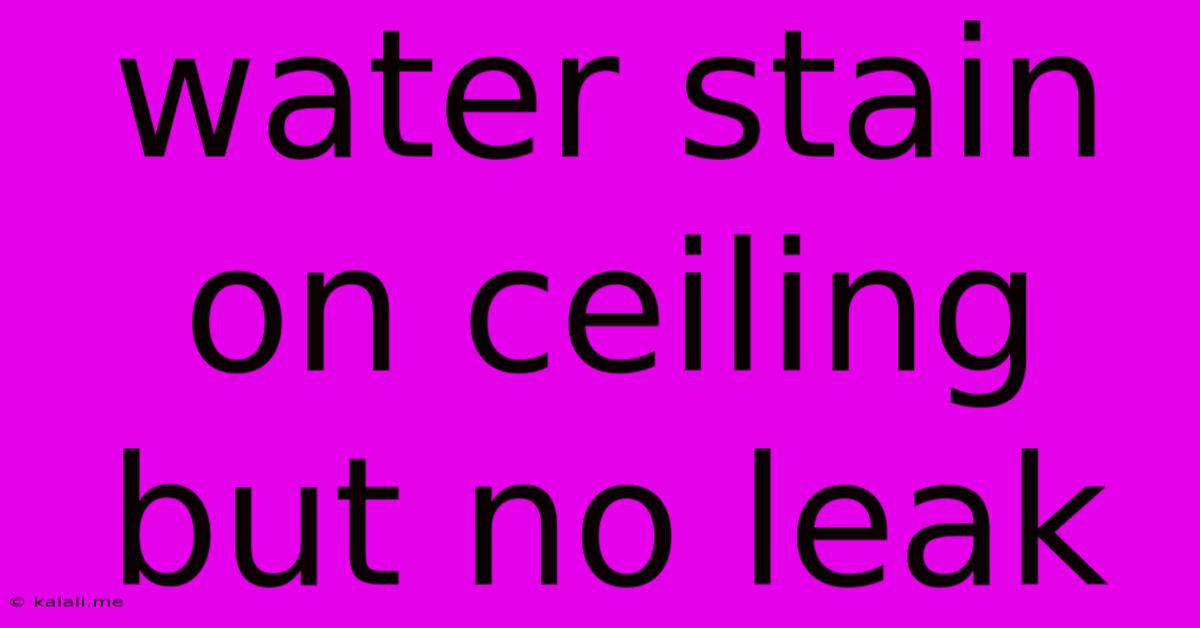Water Stain On Ceiling But No Leak
Kalali
Jun 03, 2025 · 3 min read

Table of Contents
Water Stains on Your Ceiling: No Leak? Here's What to Investigate
A water stain on your ceiling, without any visible leak, can be unsettling. It signals a past or current moisture problem that needs addressing before it leads to more significant damage. This article will guide you through the potential causes and solutions for ceiling water stains without active leaks. Understanding the source is key to preventing future problems and protecting your home's structure.
Potential Causes of Ceiling Water Stains Without Leaks:
Several factors can lead to water stains on your ceiling without an immediate, noticeable leak. Let's explore the most common culprits:
1. Condensation: A Silent Culprit
Condensation occurs when warm, moist air comes into contact with a cold surface, like your ceiling. This is particularly common in poorly insulated attics or areas with inadequate ventilation. The moisture collects, causing discoloration over time.
- Signs: Often seen in colder months, the stains might be diffuse and spread over a larger area.
- Solution: Improve attic insulation, ensure proper ventilation (install or clean existing vents), and consider using a dehumidifier in the affected area.
2. Plumbing Leaks: The Hidden Threat
Even without a visible drip, a slow leak in your plumbing system can cause significant damage over time. The water might seep through walls or ceilings, leaving behind stains long before you notice the source.
- Signs: Stains might appear near plumbing fixtures or pipes. Check for discoloration along walls. Listen carefully for subtle dripping sounds, especially at night.
- Solution: Inspect your plumbing system thoroughly. You may need to consult a plumber to locate and repair any hidden leaks.
3. Roof Issues: The Silent Dripper
Minor roof damage, such as damaged flashing around chimneys or vents, or even small cracks in your roof, can allow water to enter during rain. This water might travel along rafters and beams, eventually leaving a stain on your ceiling, far from the actual entry point.
- Signs: Stains are often concentrated in one area. Check your roof for any signs of damage, such as missing shingles, cracks, or areas of discoloration. Inspect your gutters and downspouts for clogs.
- Solution: Professional roof inspection is highly recommended to identify and repair any leaks. Proper gutter maintenance is also crucial.
4. HVAC Issues: Condensation and Leaks
Your heating, ventilation, and air conditioning (HVAC) system can also contribute to ceiling stains. Leaking condensate lines from your air conditioner or furnace can cause moisture buildup, leading to staining. Poorly sealed ductwork can also introduce moisture.
- Signs: Stains may be near the HVAC unit or ductwork. Check the condensate drain line for clogs or leaks. Listen for unusual noises from your HVAC system.
- Solution: Inspect your HVAC system thoroughly. Clean or replace clogged condensate lines and ensure proper sealing of ductwork.
5. Previous Leaks: Lingering Evidence
Sometimes, a water stain might be a remnant of a previous leak that has since been repaired. While the leak might be fixed, the stain remains as a visual reminder.
- Signs: The stain might be older, with a more defined, darkened appearance.
- Solution: This often requires professional remediation to fully address the stain. Cleaning might improve the appearance, but the underlying cause must be addressed to prevent recurrence.
Taking Action:
Ignoring a water stain can lead to mold growth, structural damage, and costly repairs. If you discover a ceiling water stain with no obvious leak, take these steps:
- Visual Inspection: Carefully examine your ceiling, walls, and plumbing for any signs of damage or leaks.
- Professional Assessment: A qualified professional, such as a plumber, roofer, or home inspector, can often quickly pinpoint the source of the problem.
- Document Everything: Take photos and notes to help with diagnosis and repairs.
By systematically investigating the potential causes, you can effectively address the water stain issue and prevent future problems, ensuring the longevity and integrity of your home. Remember, early detection and prompt action are key to avoiding significant and costly repairs down the line.
Latest Posts
Latest Posts
-
How Do You Change Case On Google Sheets
Jun 05, 2025
-
Two Or More Substances Physically Mixed Together
Jun 05, 2025
-
How To Send A Text Message As An Imessage
Jun 05, 2025
-
How To Remove Great Stuff From Hands
Jun 05, 2025
-
How To Render Video As Images In Blender
Jun 05, 2025
Related Post
Thank you for visiting our website which covers about Water Stain On Ceiling But No Leak . We hope the information provided has been useful to you. Feel free to contact us if you have any questions or need further assistance. See you next time and don't miss to bookmark.